In 2012, Intelligent Systems were reeling from the success of Fire Emblem Awakening.
Not only had their final intended Fire Emblem (FE) game saved the series from discontinuation, but its innovations had led to a spawn of new fans showing an interest in the prospect of the series' future.
What came next was the release of Intelligent Systems’ next FE instalment, Fire Emblem Fates. FE Fates told a story of war between two nations, being the peace-loving Hoshido and the tyrannical Nohr. The game's central protagonist, Corrin, was born in Hoshido but raised in Nohr. As a result, the player was presented with a choice early in the story whether to side with either of these nations. This was meant to be Fates’ main selling point: Being that it was a game with split narrative paths for the player to follow.
Just like with FE Awakening, Intelligent Systems attempted to redefine the series. Fates was sold akin to how Pokémon games sold their generational games, with both story paths retailing as separate game entries, taking the form of Fire Emblem Fates: Birthright and Fire Emblem Fates: Conquest. Adding to this, the game also housed a Canon True Ending story path, in the form of Fire Emblem Fates: Revelation.
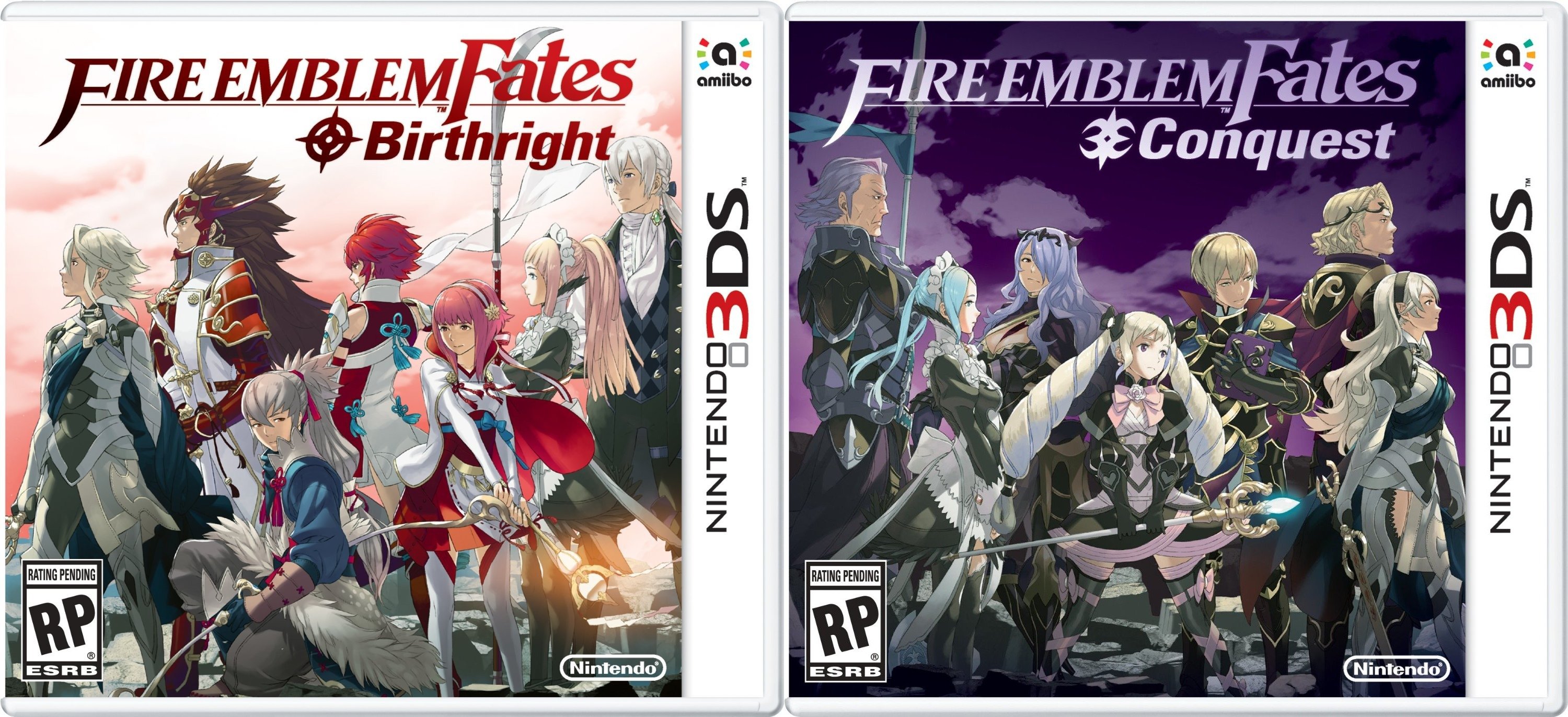
There was one caveat, however, and that was that Revelations was sold primarily as downloadable DLC for the either versions of the game. If you wanted to play it, you'd need a stable internet connection to access the Nintendo eShop service so you could purchase and install it. What if you wanted to own Fates: Revelation physically? Your best option then was to get the pricier, but expected, Fire Emblem Fates: Special Edition, which boasted collectible goodies such as an artbook, a decorative cloth and all three routes already within the game cartridge.
So where does the story go next?
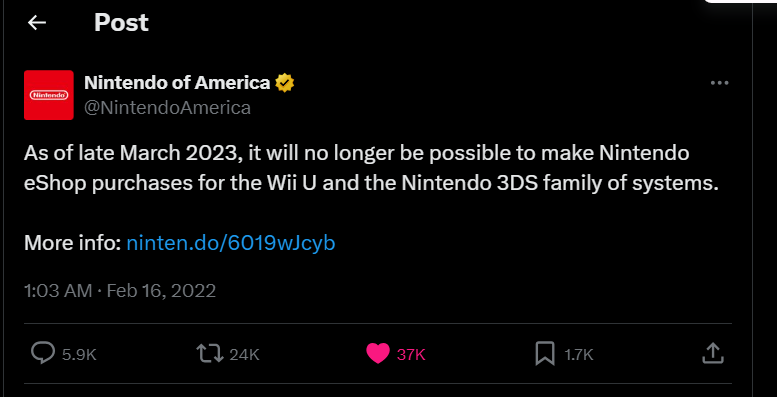
On Febuary 2022, Nintendo announced that they would be shutting down the digital eShop storefront services on their Wii U and 3DS systems. Furthermore, they also posted an additional Twitter update, encouraging Fire Emblem Fates players to buy the Fates: Revelations DLC before it was gone for good.
Now, not only had a ⅓ of Fire Emblem Fates’ story become lost media, the few owners of the Fates: Special Edition realised the true value of already physically owning the full game. As if it were gut instinct, scalpers seized their chances of jacking up their pre-owned FE Fates: Special Edition prices in an attempt to capitalise on the situation. Just like that, Fire Emblem Fates, despite being a fairly recent entry in the franchise, became one of the most elusive games to fully own with all three story routes intact.

So where am I going with this?
Like it or not, the gaming industry has gradually begun to move towards a digital age. Alongside Sony’s digital-only PlayStation consoles and the emphasis of Steam's digital marketplace taking over the mainstream PC gaming marketplace, there's been an gradual decline in prioritising physical media by the companies in charge of distribution.
That is to say that the concept of digital gaming itself isn't entirely wrong itself. The value of Cloud Saves keeping your progress intact, alongside the ease of having a game already within your Home Menu without requiring you to get up to insert a disc has proved itself invaluable to many. Even so, everything has its drawbacks. Just like Fire Emblem Fates, there are a myriad of other game series that have suffered because of companies neglecting to preserve their IPs.
Still, this hasn't stopped a some publishers from trying to adapt their legacies. As is the case with
ATLUS and their numerous Persona 3 Iterations
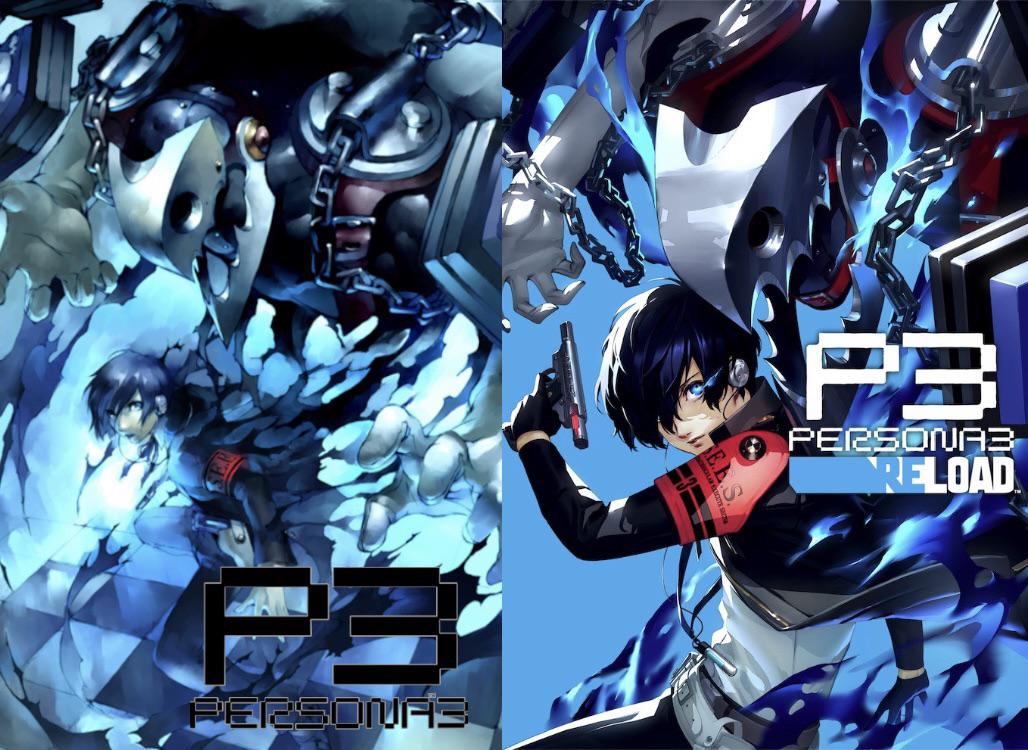
Nowadays, a newcomer's entry point into the Persona series is more open than ever before. It didn't always used to be like this, though, and neither is the current prediciment perfect either.
Persona 3 (P3) came out in 2006 for the PlayStation 2, acting as ATLUS’ attempt in redefining the series, with its brand new calendar-system approach. Through its success, the game boasted another expansion, titled Persona 3 FES (P3 FES), that acted as an expansion of the game, including new story content and a brand new Epilogue campaign, aptly titled, The Answer.
For a while, fans had been content with these versions of the game, ultimately deciding that P3 FES was the ‘definitive’ version of the game. But it didn't end there, because ATLUS had more in store for their succesful Persona installment.
Persona 3 Portable came out in 2009 for the PlayStation Portable, acting as a less ambitious adaption of its base game. While the game neglected to include The Answer campaign from FES, there was instead the addition of a new story route through the inclusion of a new female protagonist.
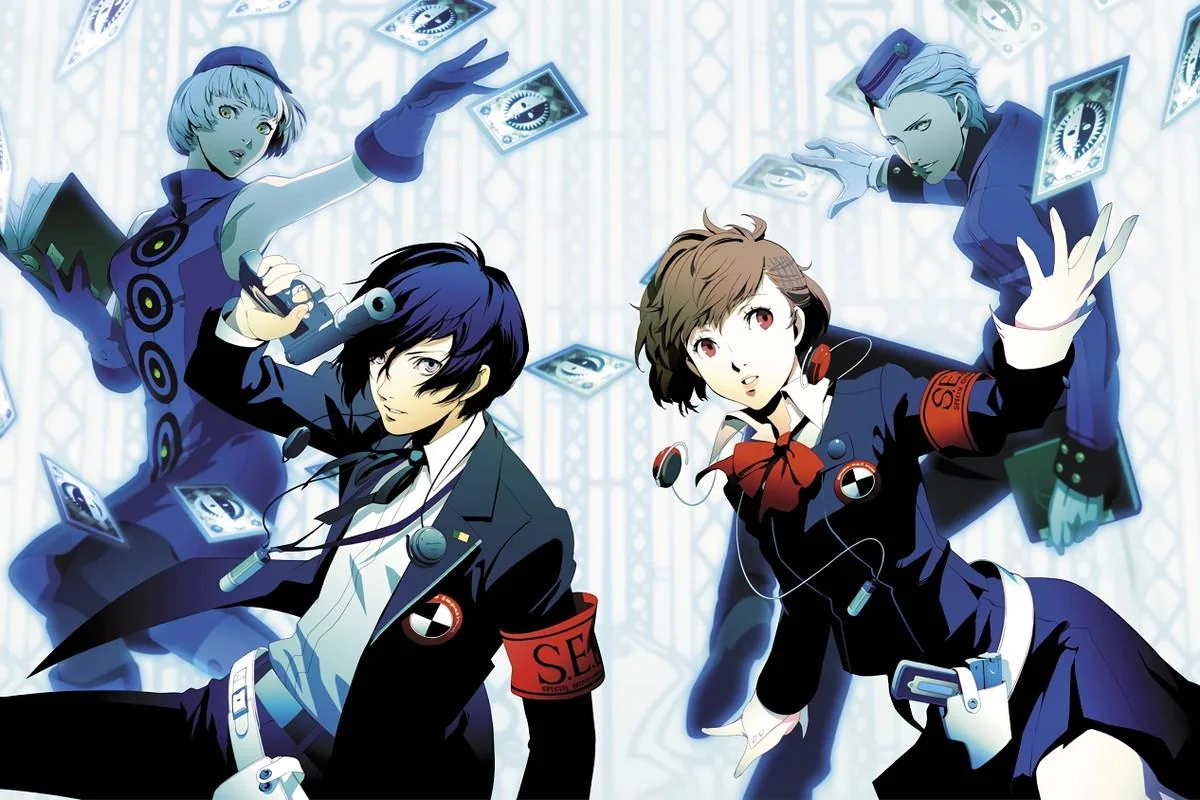
Unlike Makoto; the male protagonist, Kotone; his female counterpart, allowed for the player to experience different story and gameplay tweaks to the base P3 narrative. Through this, Kotone’s route opened up new character stories, while also letting players discover different sides to pre-existing ones through her more jovial dialogue options.
As time passed, Sony no longer supported the PlayStation 2 and Portable consoles. Eventually, fans began clamouring for the revival of a “definitive” Persona 3 port. They imagined this would entail a possible remake for the game, alongside The Answer and Kotone's inclusion, to help preserve the game's entire narrative for newer audiences while also including its unique content from each version.
In return, ATLUS delivered on this wish in their own archaic way. During the series' 25th anniversary, a modernised port of Persona 3 Portable, alongside Persona 5 and 4 Golden’s console debuts, were announced.
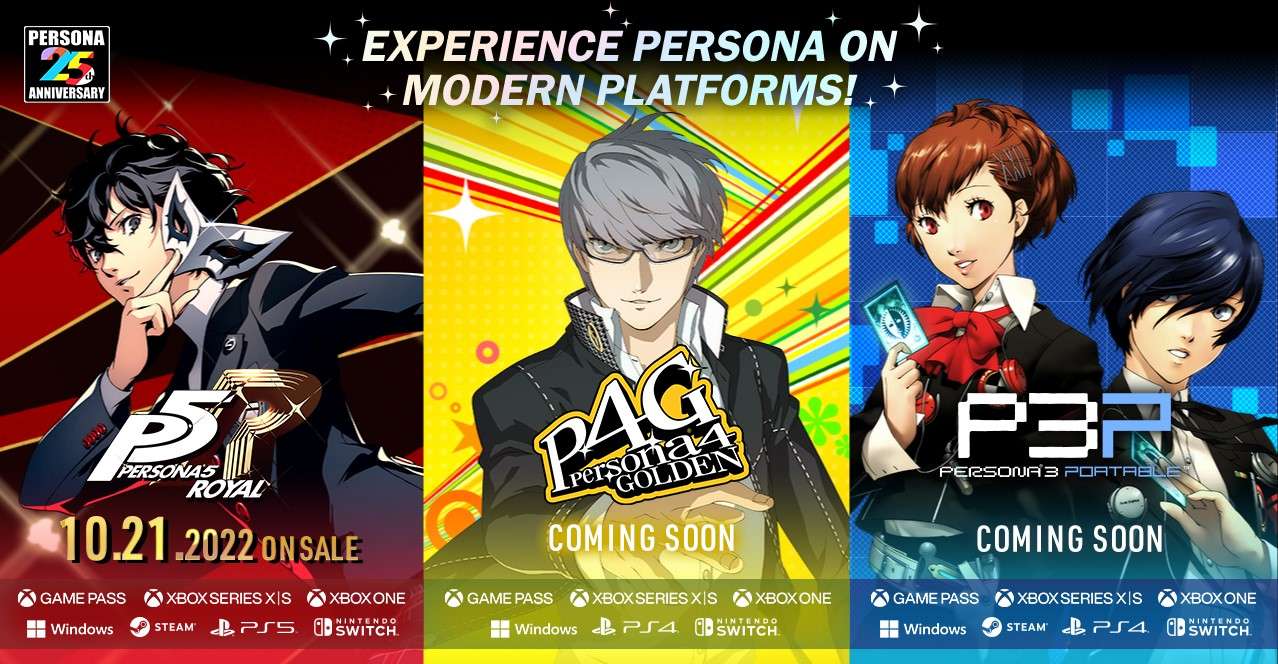
Except, Persona 3 Portable’s modern iteration had its own issues.
To begin with, P3 Portable by itself was already a heavily compressed version of its original game, lacking animated cutscenes and 3D models for its in-game story. Even if Kotone herself was a nice addition, as ATLUS put it themselves: she was intended more so for returning P3 players than newer ones.
Even so, there were some also gameplay issues that the modern port exclusively suffered from, such as the in-game assets using AI-upscaled images, alongside voice lines of the game being muffled compared to their original counterparts. Fans soon began feeling as if this modern P3 Portable iteration had been rushed for the sake of meeting an Anniversary quota instead of honouring the legacy of its series.
Even still, more optimistic remnants of the fanbse couldn't help speculating that this was a sign of things to come. Perhaps ATLUS were secretly working on an entirely original remake for Persona 3, whereas the Portable port was done only to bring Kotone’s story route to a more accessible format.
2024, Persona 3 Reload was announced.
This would be a remaster of the original Persona 3, with some slight alternations. Upon release, the game would lack FES', The Answer Campaign, instead coming with other additions from FES (chronicled here), alongside some Reload-unique content in the form of previously unseen Character Events regarding the more underutilised characters in the game.
Fans were mixed on this release initially. Even so, Persona 3 Reload was a great game. While hardcore fans may have respectfully argued that its attempt at modernising the original game changed the core messages of the original, there was still plenty of applause for the game from newer fans and critics alike.
Eventually, FES' The Answer epilogue was finally added to Reload, in the form of paid DLC content. This expansion took after the original Japanese title, titled, “Episode Aigis”..
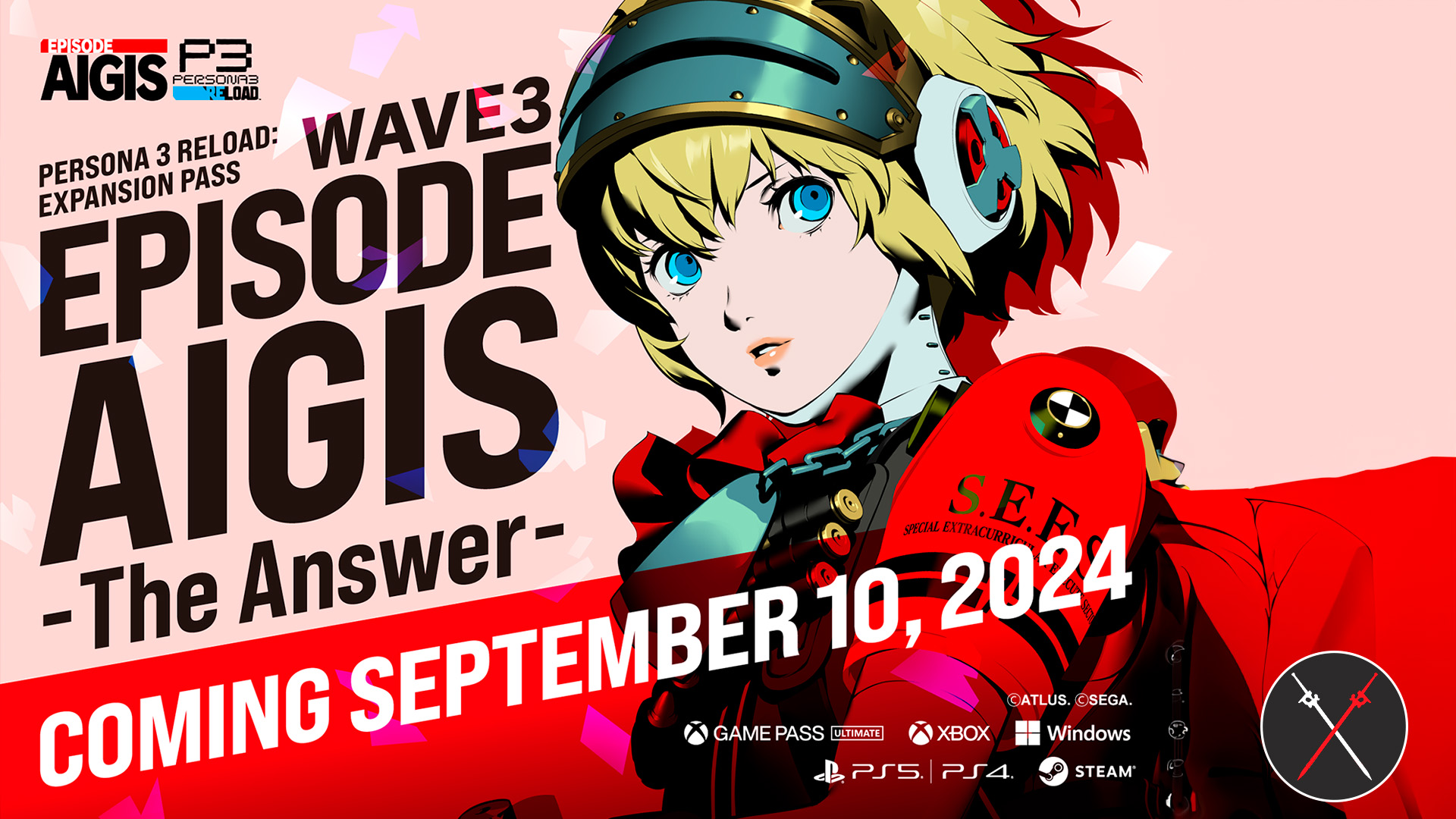
Yet it didn't stop people from arguing that Persona 3 Reload and Portable were completely replacing the original.
Despite Reload being well-received from a majority of fans and critics, this didn't stop more hardcore fans from feeling that ATLUS were forgetting the original and its more challenging approach to gameplay. Putting it bluntly, unless you were willing to shell out good money for an original PlayStation 2 copy of Persona 3’s original or FES, there is no official way to play it.
Unlike Persona 4 Golden, FES was never ported to online storefronts like Steam, leaving it to drown out in obscurity as a result. Sure, Persona 3’s full story was technically accessible through Reload, Portable and Episode Aigis, however, ATLUS’ original interpretation of the game was still fated to be lost to time.
Hypothetically, if you ever wanted to see how Persona 3 used to handle its original voice cast, more harsher gameplay structure, or distinctly more Avant Garde animated cutscenes, then your best options would be to pay a fortune for its original variants, or to watch YouTube videos showing these differences without actually playing the game yourself.
Preserving the legacy of gaming is a tall task.
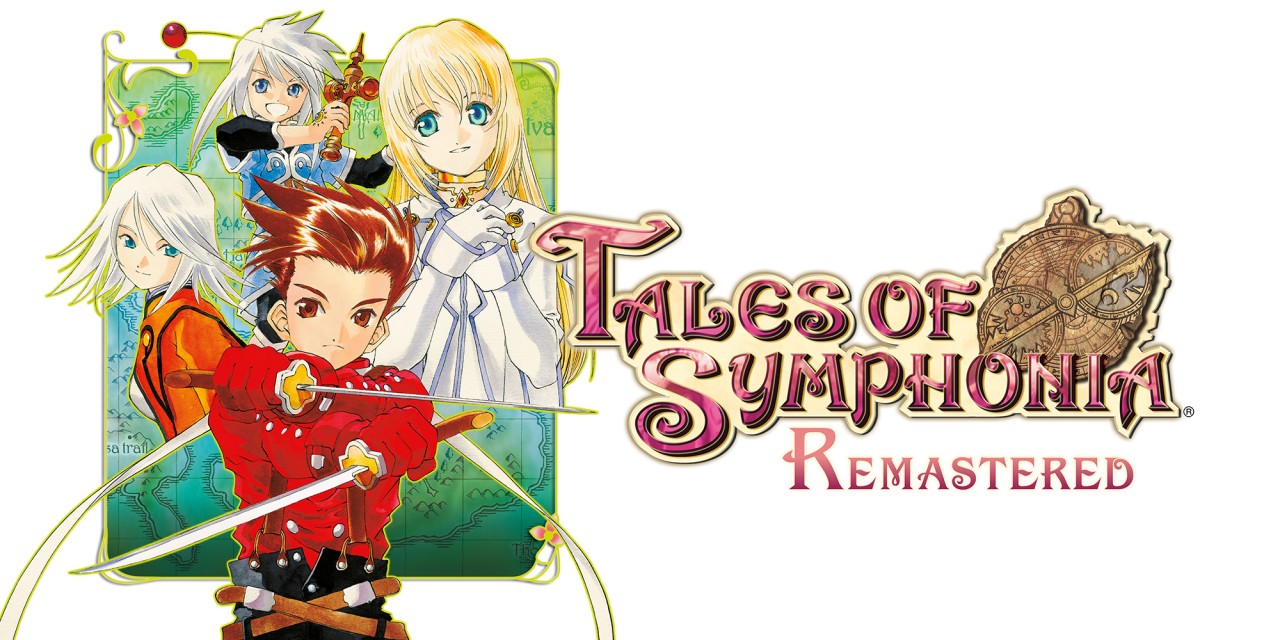
Not every attempt to carry over relics from the past can be successful. Even so, what matters is the idea of even attempting it in the first place.
Bandai Namco are a game developer who are most famous for their work regarding Pac-man, Code Vein, and Katamari Damacy. They hold a number of famous IPs, and this has unfortunately meant that some of their legacy had been lost to inaccessibility.
Even so, Bandai haven't stopped attempting to honour their history, through the Tales of series’ 25th port for Tales of Symphonia. While hopes were initially high, they were soon squashed upon the game's arrival boasting numerous technical issues upon arrival.
These included hiccups such as frame rate drops, long loading times, and missing textures. In return, Bandai apologised for their mistakes, later patching the game to make up for their rushed port.
Even if they initially failed once, this didn't stop Bandai from trying once again to bring over their older games. Bandai’s recent Tales of Graces F remaster was met with overwhelming praise for its port, due to it's newly added quality-of-life features enhancing the game without hampering its original interpretation in the process.
Furthermore, Bandai even went a step further and announced an interest in porting more of their legacy Tales of titles for modern audiences over the next coming years. Needless to say, things are looking up for Tales of fans.
But what happens when a company refuses to acknowledge their abandoned legacy entirely?
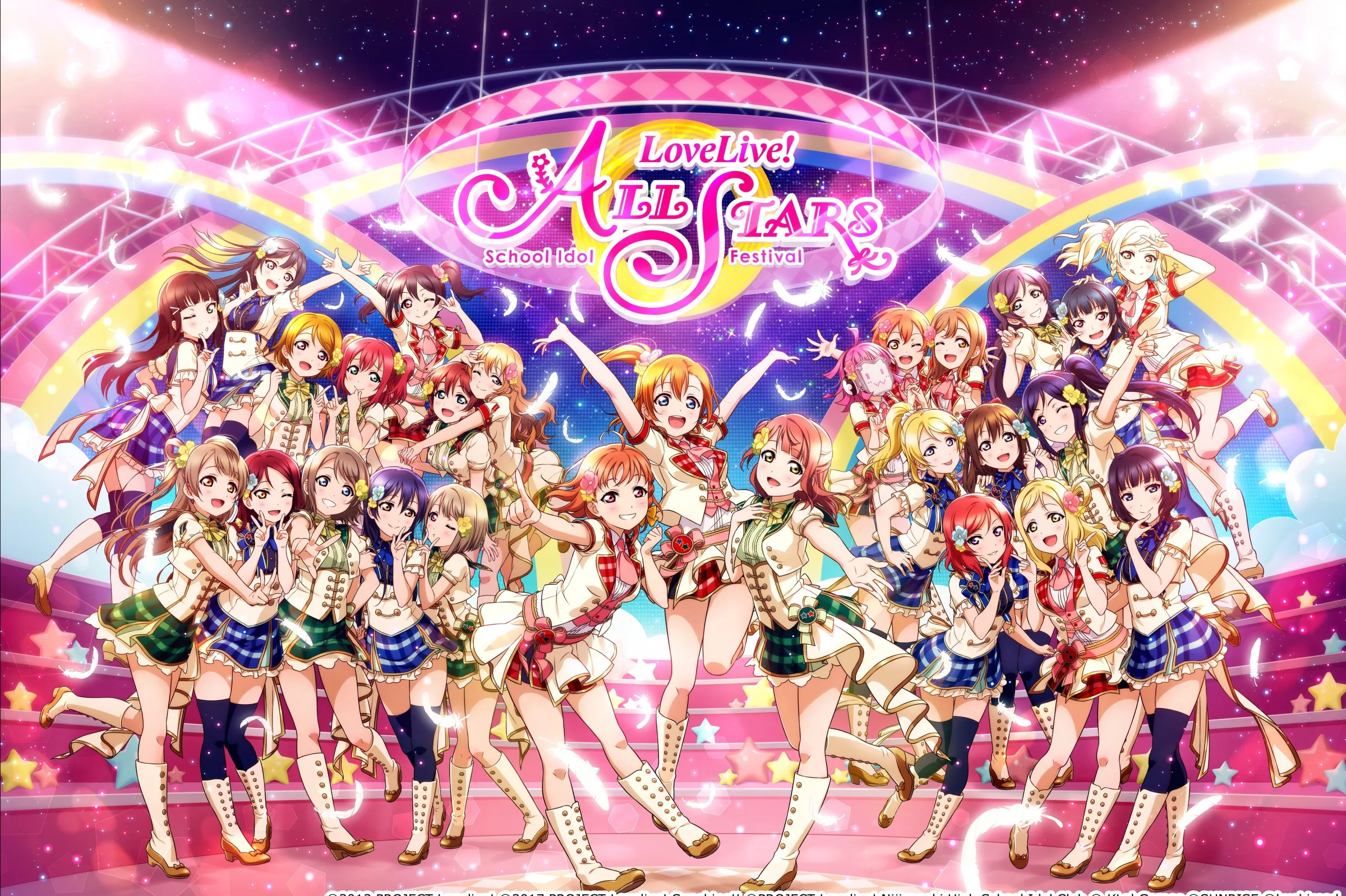
2023 was an interesting year for committed Love Live! fans. The famous Gacha mobile game, School Idol Festival All-Stars (better shortened to as, “SIFAS”) announced its termination, with a sequel set to take its place in the form of SIFAS 2. Many theorised this to was likely due to financial reasons. Even so, the fact didn't change that this was a new circumstance for the multimedia franchise and its fanbase.
Eventually, the fated day arrived…
On January 25th of 2024, the official Love Live! Staff account posted a tweet that would be infamous not just within its expected audience - but amongst the gaming sphere worldwide.
The tweet in question, was this:
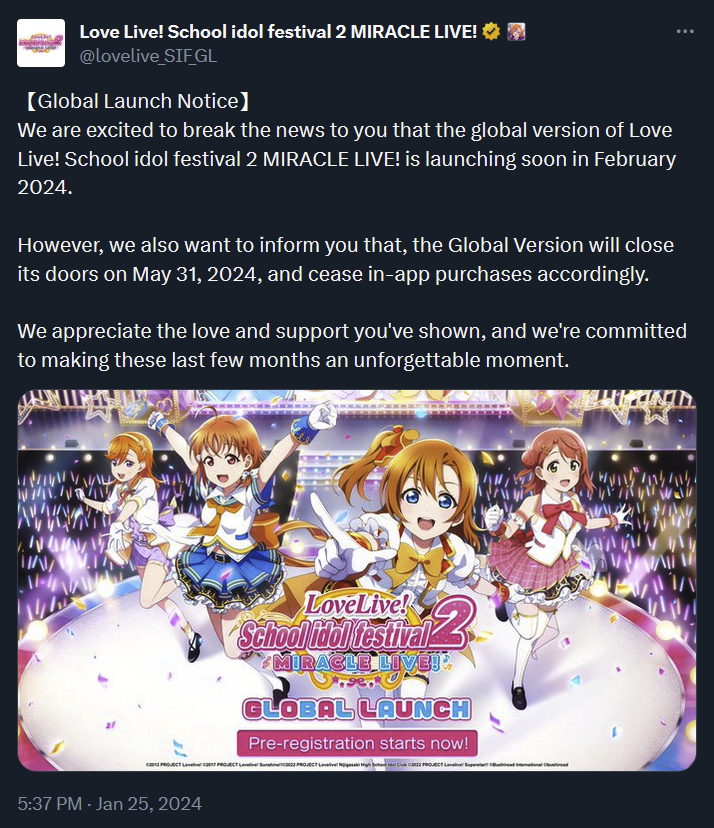
In retrospect, maybe announcing the release date of an upcoming game alongside its termination wasn't the best idea...
In realising that producer, Bushiroad, weren't interested in the game's legacy themselves, fans quickly tasked themselves with archiving as much of the game content as they could. Soon after, the Love Live! SIFAS archive was born, eventually being advertised on Reddit’s r/lovelive forum platform afterwards.
So while SIFAS may not be entirely playable, its story and unique content had been collected up by fans in honour of the game’s shutdown. Even so, a lot was lost from these events in the first place.
SIFAS was one of the few ways that the Love Live! franchise would regularly cross their characters over through inter-group interactions. The game being set in a story continuity outside of the series’ anime installments meant that it could officially explore possibilities of rare interactions between characters that would have otherwise never interacted with each other before.
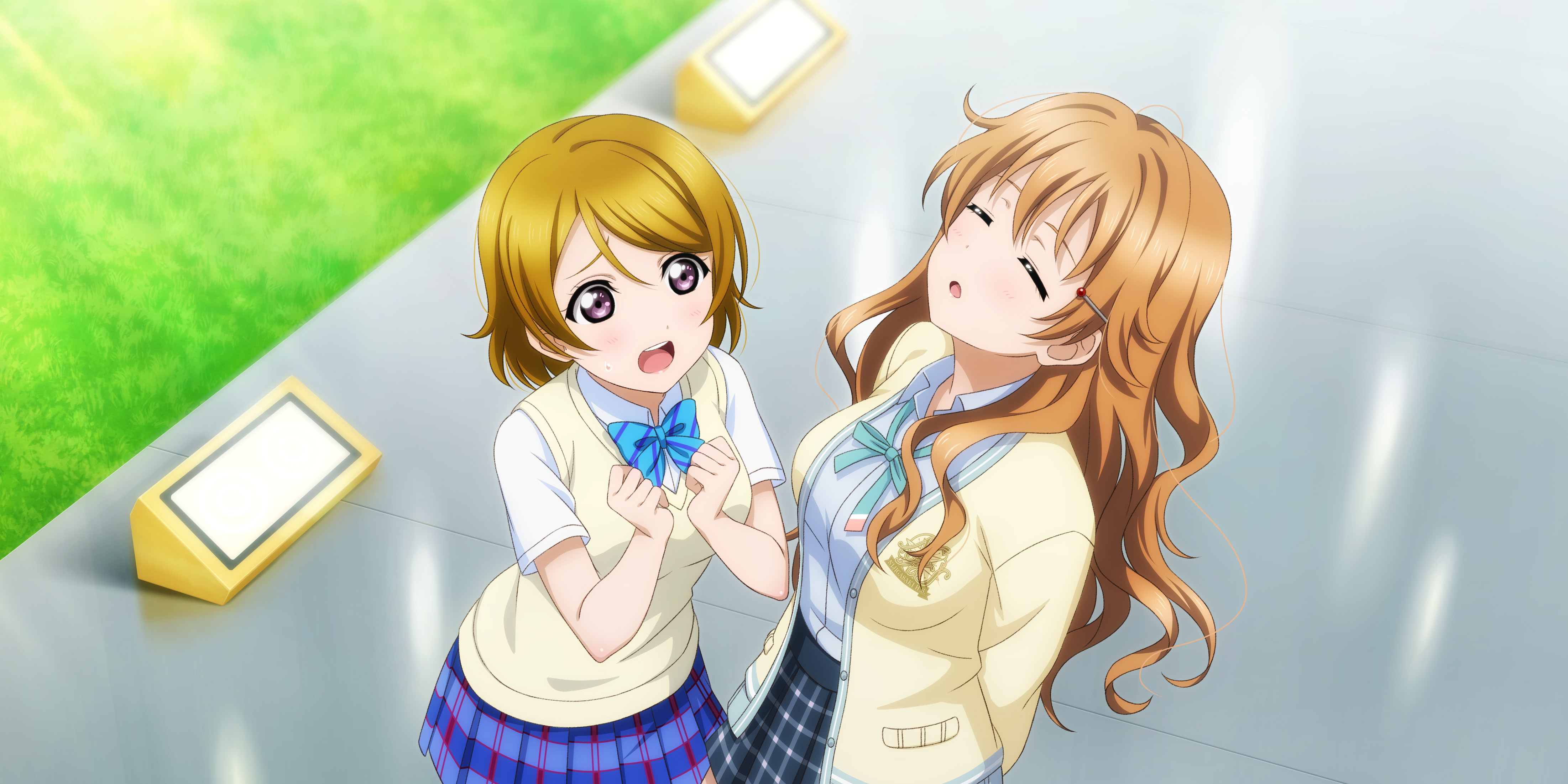
Not only that, but the anime that had adapted SIFAS’ story, Love Live! Nijigasaki High School Idol Club, had very loosely adapted the game's story. This led to certain characters from the game being written very differently to the original game, such as Lanzhu and Shioriko (for more info on how Lanzhu was changed, look to the character analysis I wrote on my blog).
As such, there is a point to be argued that SIFAS’ mainstream shutdown was in-turn burying the series’ previously established stories in favour of completely replacing them through their newer anime adaptations. Sure, we could still get cross-character interactions through rare cases such as the Japanese-exclusive Love Live! Days magazine, but if we were to talk about the series as a whole: A lot was lost for the fanbase after both SIFAS and its sequel's shutdown.
Concluding on a grim note…
If you've been paying attention to this article without skipping to my final thoughts (most people do that, don't worry ;-;), you'll notice that my thoughts on media preservation conclude towards it being incredibly important to the gaming sphere as a whole. This is especially true for the case of video games.
Like it or not, we're reaching a point now where certain fanbases are kicking themselves over not being present for a game during its release era. Fire Emblem Fates and Persona 3’s original and FES iterations are examples of this. Unless you're willing to doll out a shed load of quarters, you're better off dreaming about playing those games than legally owning them.
Are there other means to playing these games? Of course. Until now, I'd neglected to mention the topic of illegitimate ownership and emulation. Even so, these means of playing videogames aren't welcome by everyone, and neither are they sometimes perfectly ethical.
Simply put, if a company isn't putting in the effort to preserve their products and IPs, then that begs a discussion regarding the worth of these alternative means when it comes to experiencing old media.
Alternatively, Nintendo’s Switch Online services do offer the company's own legal ways of reliving old classics. At the cost of a regular subscription payment, members can play through various SNES, NES, Nintendo 64, and Gameboy games through their dedicated apps on the Switch system.
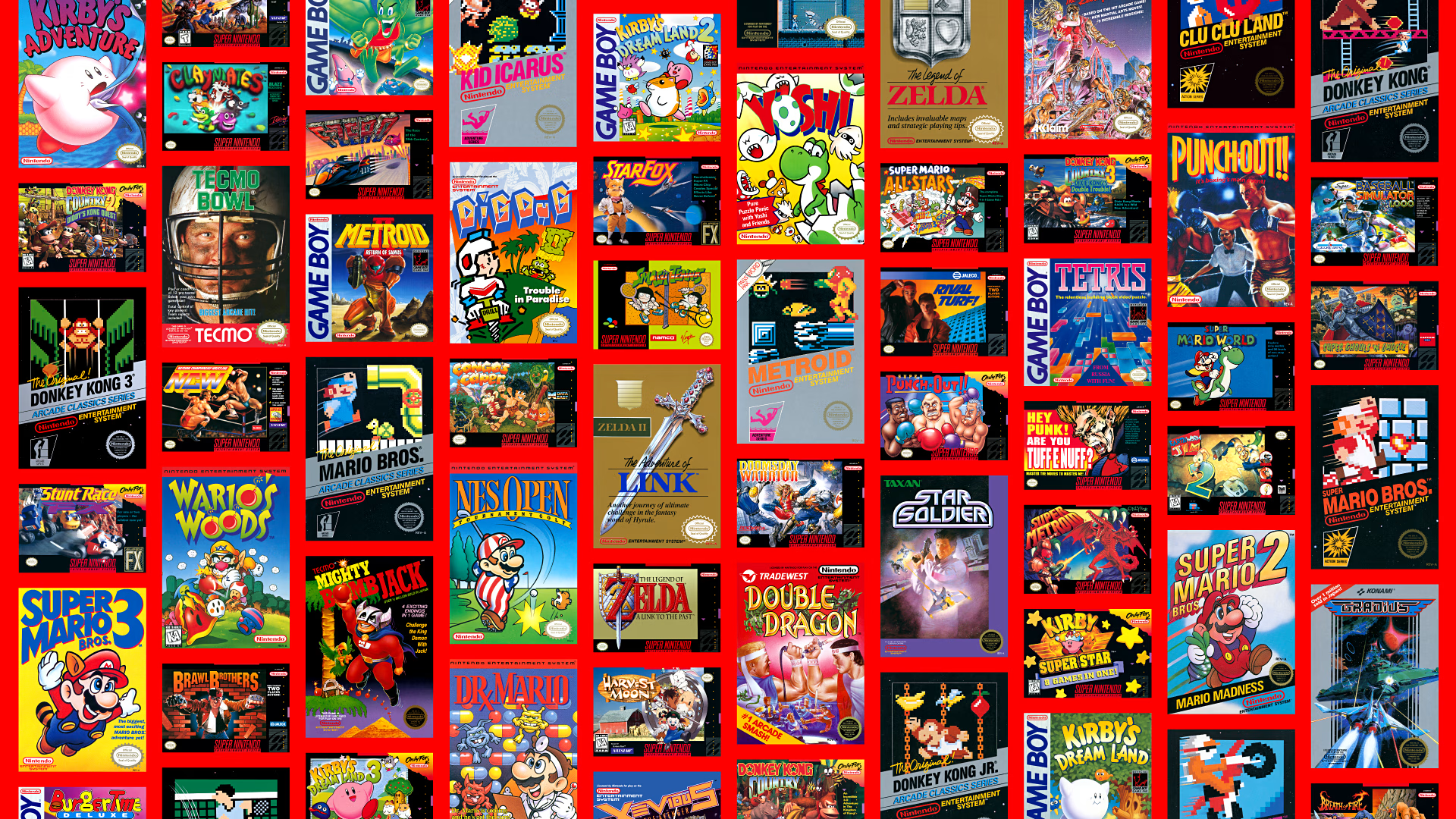
The only cost comes at the knowledge of this merely being a subscription, and not full ownership. Nintendo has long since abandoned selling their legacy titles like they used to via their Virtual Console branding. This is primarily due to their reliance on adding value to their Switch Online services.
Regardless,
Media preservation is still incredibly important in maintaining the landscape of the medium as a whole. While most companies seem to prefer ignoring their old legacies in favour of moving forwards, cases such as Bandai Namco’s Tales of remasters provide a hope for the more optimistic. One could hope that once developers and publishers notice a value in maintaining their legacies, that things will only look brighter for the industry moving forwards.
Like it or not, video games are an art form. If we want to look back and admire its works for the future to come, then we need to start thinking about our efforts to protect it seriously.